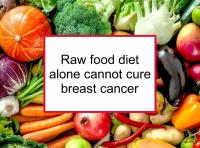While a raw food diet would be better for purposes of preventing cancer than the typical U.S. diet, no scientific studies have reported that the diet alone can put breast cancer in remission in the absence of conventional medical treatment. Some people incorporate raw animal products (meat, milk, eggs) into their raw food diets.
For purposes of the present discussion, we mean raw vegan diets (i.e., uncooked plant foods) when referring to raw food diets. While the raw food diet is beneficial overall, we would recommend modifying it to enhance it's effectiveness in reducing risk of breast cancer or its recurrence.
What is the raw food diet?
Many raw food diet proponents offer versions of the theory that since early man did not cook his food, we are best suited physiologically to consuming raw food. Others focus on the known health benefits of eating raw fruits and vegetables. The diet is admirably suited to losing weight and has been shown to reduce risk factors such as high cholesterol, hypertension, and high blood sugar that are associated with important degenerative diseases, including cancer. People who adopt the diet have reported heightened feelings of well being (after an initial adjustment period). While the diet has many variations, the following rules are typical:
More stringent versions of the diet may also include some of the following restrictions:
- No oils, including cold-pressed oils
- No natural sweeteners, including honey or maple syrup
- No dried or dehydrated foods (e.g., dried fruits)
- No onions or garlic
- No hot peppers
- No spices
- No supplements
- No green drinks
- Less than 15% of weekly calories from fat
The strict form of the diet consists primarily of fruits, vegetables, nuts (including coconut) and seeds. The absence of oils, which increase the bioavailability of carotenoids such as beta-carotene, could make it difficult to obtain optimal levels of some carotenoids in the diet.
Raw food diets might result in some deficiencies
Deficiencies in nutrition (listed below) have been reported in some long-term adherents to raw food diets. Those on such diets for an extended period of time should monitor their levels periodically and take corrective action, if necessary.
- Iodine
- Calcium
- vitamin B12
- Vitamin B2 (riboflavin)
- Vitamin D
- Zinc
Raw food diets can also increase dental erosion and reduce fertility in some women.
Foods that affect risk of breast cancer
Avocados and avocado oil are prominently featured in some raw food diets, but there is some evidence that they could heighten the risk of breast cancer. The following foods and supplements can be important for preventing breast cancer, but are omitted from or limited in some raw food diets:
- Calcium-rich foods
- Fatty fish
- Onions and garlic
- Vitamin D supplements
Generally speaking, raw vegetables have a higher nutrient content than cooked vegetables. However, tomatoes are best consumed cooked to obtain the highest proportion of bioactive micronutrients from them
Raw food diet as cancer cure
As mentioned above, there is no objective peer-reviewed scientific evidence that raw food diets can cure breast cancer. Foods that have been associated with reduced cancer risk for the most part contain compounds that support healthy DNA replication, cell functioning, and immune system operations. Once the body's defenses have been breached so that a cancer is well established, the benefits of healthy eating appear for the most part to be too subtle to make a critical difference in overcoming the substantial defenses mounted by breast tumors.
Please see our article for those who are thinking of using a raw food diet alone to treat breast cancer for more information.
